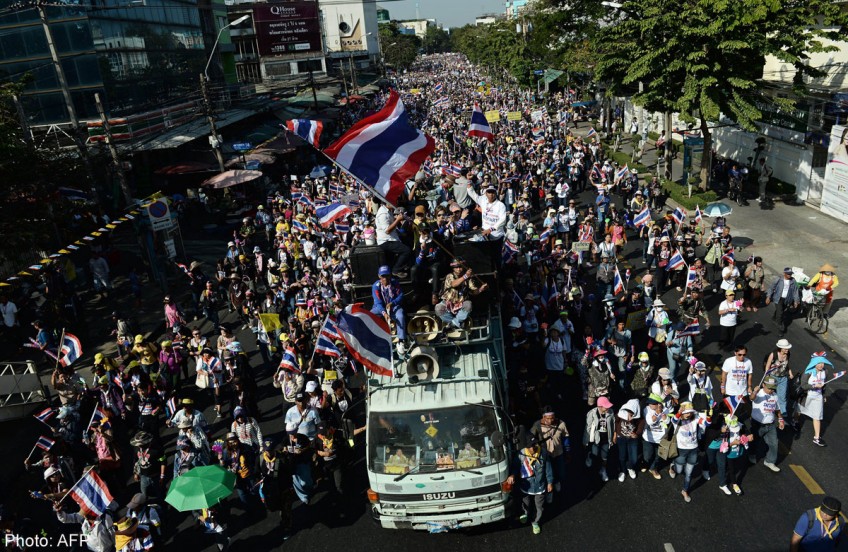Thai opposition protesters launch Bangkok "shutdown"

BANGKOK - Thai opposition protesters launched their attempted "shutdown" of Bangkok on Monday, occupying key intersections in the capital in an escalation of their campaign to unseat Prime Minister Yingluck Shinawatra.
The demonstrators want the embattled premier to step down to make way for an appointed government that would oversee electoral reforms to curb the political dominance of her billionaire family and tackle a wider culture of money politics.
Thousands of flag-waving protesters, some wearing T-shirts with the slogan "Bangkok Shutdown", massed at strategic points in the city, including outside a major shopping mall that was set on fire during deadly political unrest in 2010.
"We will fight regardless of whether we win or lose. We will not compromise or accept negotiation," protest leader Suthep Thaugsuban told crowds at a rally late Sunday.
The firebrand opposition politician - who faces a murder charge in connection with a deadly military crackdown on political protests when he was deputy premier in 2010 - was set to lead a march through the city centre later on Monday.
But it was still unclear how much support he would enjoy among city residents, some of whom voiced fears that the action would hurt their livelihoods.
"Of course it affects me - I'm very stressed," said hair salon owner Tong, 69. "No customers are coming now as my regular customers cannot drive here."
Authorities say they are ready to declare a state of emergency if there is fresh unrest, and roughly 20,000 police and soldiers will be deployed for security.
But they have not tried to stop the demonstrators taking over parts of the city in the run-up to the February 2 elections, which they have set out to disrupt.
View Protest Sites during Bangkok Shutdown in January 2014 in a larger map
The protesters have vowed to stop officials going to work and cut off power to key state offices as part of the shutdown efforts, which authorities have warned could lead to further bloodshed.
Several shots were fired at the headquarters of the opposition Democrat Party in a drive-by shooting in the early hours Monday but nobody was hurt.
A member of the protesters' own security team was shot and wounded late Sunday after a quarrel with another unidentified man near a rally site, police said.
Eight people, including a policeman, have been killed and dozens injured in street violence since the protests began over two months ago.
The civil strife is the worst since 2010, when more than 90 people were killed in street clashes between pro-Thaksin protesters and the military.
"It's going to be very volatile," said Pavin Chachavalpongpun, a former Thai diplomat and associate professor at the Centre for Southeast Asian Studies at Japan's Kyoto University.
He said there was a risk of "political violence", with protesters under pressure to achieve their objective of removing the government before the election, which would likely return Yingluck and her party to power.
"In a way there is no turning back for the protesters, they have come too far," he added.
The current political crisis is the latest chapter in a saga of political instability and periodic unrest that has gripped Thailand since Yingluck's older brother, former premier Thaksin Shinawatra, was ousted by royalist generals seven years ago.
The billionaire tycoon-turned-politician, who lives abroad to avoid a jail term for corruption, has large electoral support particularly in northern Thailand, where he is adored for a swathe of popular policies.
But he is reviled among the country's elites and by many in the Bangkok middle class and Thai south, who see him as authoritarian and accuse him of buying votes.
The protesters want an appointed "people's council" to run the country and oversee vaguely defined electoral reforms, such as an end to alleged vote buying, before new elections are held in around a year to 18 months.
The impasse has revived fears of a judicial or military ousting of the government, in a country which has seen 18 actual or attempted coups since 1932.
Police said there were 12 hospitals, 28 hotels, 24 schools and five fire stations within the areas affected by the planned shutdown.
They estimate that 700,000 vehicles travel past the seven planned protest sites on a normal day in the congested Thai capital.
Most people appeared to have opted to leave their cars at home and traffic was light in the city centre. The Bangkok metro and skytrain were running and many people were seen going to work as usual.
The shutdown has sparked panic buying among some residents and the US embassy has advised stockpiling a two weeks' supply of food, water and medicine.